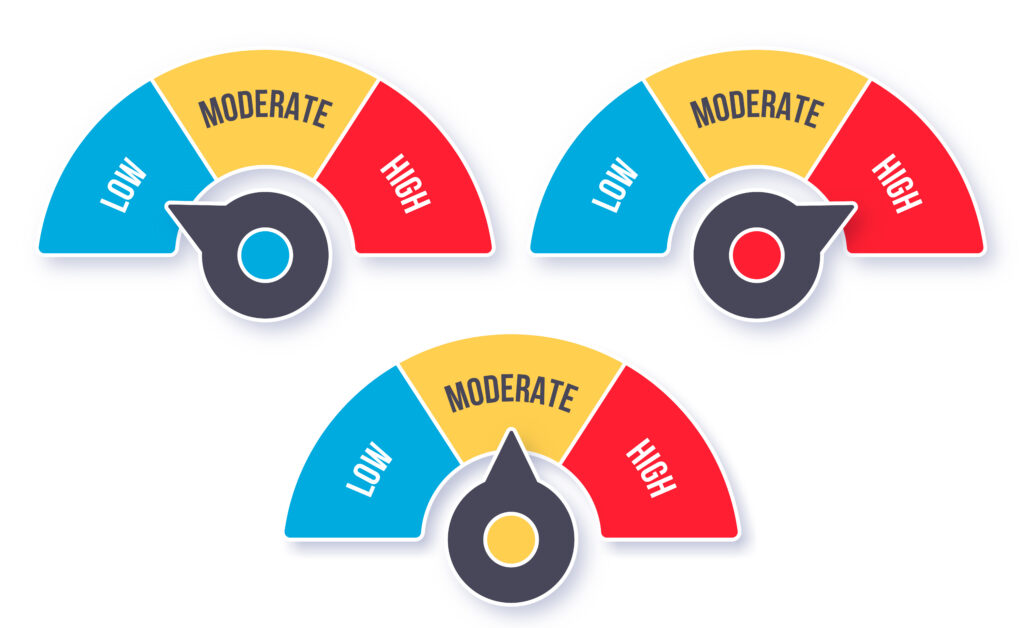Many Americans dream of a middle-class lifestyle, which has looked even rosier over the past five years. A bullish stock market characterized the period before the pandemic, and record-breaking increases in housing prices followed. Business closures coupled with government stimulus money caused the personal savings rate to skyrocket.
But now, it seems the middle-class wealth boom is coming to an end, according to a Bloomberg News report that analyzed new data on wealth. Middle-class families are feeling the pain of inflation, a volatile stock market, and rising mortgage rates more than their higher-earning counterparts, who can more easily absorb the changes. What comes next in their financial journeys?
Middle-Class Wealth Grew Rapidly Over the Past Five Years
In March, the average wealth of the American middle class reached $393,300, the highest it’s been in history. That figure includes savings, home equity, and other assets. Most of the increase was driven by rising home prices. Homeowners in Idaho, for example, saw the values of their homes increase by nearly 122% over the last five years. Some metro areas in Florida and Arizona even realized gains of over 200%, according to CoreLogic data.
People who bought homes before the pandemic and those who took out a mortgage while interest rates were low benefited from these unprecedented boosts to home equity. Middle-class home equity values rose by $5.7 trillion between mid-2017 and mid-2022. The group now holds $17 trillion in housing wealth, representing 60% of total housing wealth in the United States, data from the Fed shows.
It should be noted that there are multiple definitions of the middle class. Some experts define it qualitatively as having a house, a car, and a retirement account. Pew Research defines middle-class households as those who earn incomes between two-thirds and 200% of the median. The wealth data from the Bloomberg report skews higher income, including adults over 20 with between $48,000 and $170,000 in annual income and between $96,000 and $1.07 million in net worth.
While the wealth of middle-class earners may have increased over the last five years, the size of the group has continued to contract. It’s not a new phenomenon but rather a trend over the past five decades. And it’s unclear whether current economic conditions will exacerbate the issue.
The Percentage of Americans with Middle-Class Incomes Continues to Shrink
Since 2000, roughly one in four middle-class earners have either fallen into the low-income group or moved up the ladder to become high-earners each year. College-educated folks were more likely to see their incomes increase, while those without high school degrees were more likely to move down. Middle-class Black and Hispanic adults were also more likely to move down the income ladder than up.
Experts attribute this to several factors, including an increasing reliance on trade with countries with low labor costs. Another primary cause is the decline in middle-income job opportunities offered to less educated individuals. Looking back to 1980, people without college degrees were equally split between low-income and middle-income occupations. But by 2016, only 29% of non-college workers held middle-income jobs—most of the change occurred because workers without college degrees were pushed into low-paying jobs rather than moving up the ladder as a result of training or experience. This shift had a relatively outsized impact on workers in urban and metropolitan areas, especially minorities with high school educations.
Now, Wealth in the Middle Class is Declining
At the peak of middle-class wealth in March, the average middle-class adult was $120,000 wealthier than in January of 2017. But by October 25, middle-class earners lost about $27,000 in average wealth since the peak, a 7% decline. That’s the biggest drop in average wealth since the financial crisis that began in 2007.
The remarkable increase in wealth leading up to the peak may be enough to insulate the middle class during a recession. With the consumer price index up 8.2% from last year, 78% of middle-class Americans report cutting back on spending at least a little bit—but there’s a chance that could be the extent of the impact.
While research suggests the Fed’s plan to raise the federal funds rate to 2008 levels will cause rising unemployment, it’s expected to affect low-income workers in rural areas the most. Will the middle class stay safe from layoffs, and will their savings and housing wealth act as a cushion for price increases?
Will Housing Wealth Insulate the Middle Class from a Recession?
Some economists believe middle-class housing wealth will help cushion the recession’s blow for the entire economy. Housing wealth isn’t liquid—without taking out a home equity loan at today’s high rates, middle-class homeowners can’t access their housing wealth to help with their rising expenses. But fixed mortgage payments give homeowners more wiggle room than renters facing skyrocketing rent prices.
And while some housing markets are cooling off due to higher mortgage rates limiting the pool of potential buyers, most experts don’t see a crash in the near future. Younger generations are fueling high demand for homes while supply remains low. And stricter lending standards mean today’s borrowers are much less likely to default than their counterparts who took out mortgages in the 2000s. That means it’s likely that middle-class homeowners will continue to realize appreciation gains that may help offset increasing expenses.
Could the Job Market Increase Middle-Class Jobs, or Will More People Fall Out of the Middle Class?
The unemployment rate currently sits at 3.7%. There’s a chance that the competition for and high cost of hiring educated and trained professionals will lead businesses to provide more on-the-job training, creating more middle-class jobs. We’ve also seen pandemic employment trends reversing, with layoffs in higher-paying fields, such as finance and tech, and gains in some industries like travel. The Inflation Reduction Act seeks to create more registered apprenticeships, giving low-income workers a chance to climb the ladder.
But there are signs the job market is already cooling. Major employers aren’t hiring new workers as rapidly as they once were. Turnover is also down, indicating that the job-hopping trend is winding down, and wages aren’t increasing as rapidly as last year. Executives report that it’s getting easier to attract and hire talent. If a decrease in consumer spending converges with the cooling job market at a time when it’s expensive for businesses to access capital, middle-class jobs could be at risk.
If unemployment rises for the middle class, the size of the group could contract even further. Non-college-educated workers who are laid off from middle-class jobs may be pushed into low-income jobs. Meanwhile, high mortgage rates alongside high rents and expensive groceries are making it more difficult for people to become homeowners and build middle-class wealth. Each new generation has experienced a decrease in the homeownership rate since the boomers. Homeownership is less affordable now compared to historical averages in most of the United States.
And since housing wealth is a means for passing down wealth through the generations, the problem could continue to snowball. It could become more difficult for low-income earners to enter the middle class, while at the same time, a recession could cause some middle-class earners to fall out of the group. But middle-class adults remain optimistic. 81% believe their children will have even better financial prospects, according to a Harris poll. Whether or not their expectations are met depends on a wide range of factors impacting an unpredictable economy.
On The Market is presented by Fundrise
Fundrise is revolutionizing how you invest in real estate.
With direct-access to high-quality real estate investments, Fundrise allows you to build, manage, and grow a portfolio at the touch of a button. Combining innovation with expertise, Fundrise maximizes your long-term return potential and has quickly become America’s largest direct-to-investor real estate investing platform.
Learn more about Fundrise
Note By BiggerPockets: These are opinions written by the author and do not necessarily represent the opinions of BiggerPockets.













